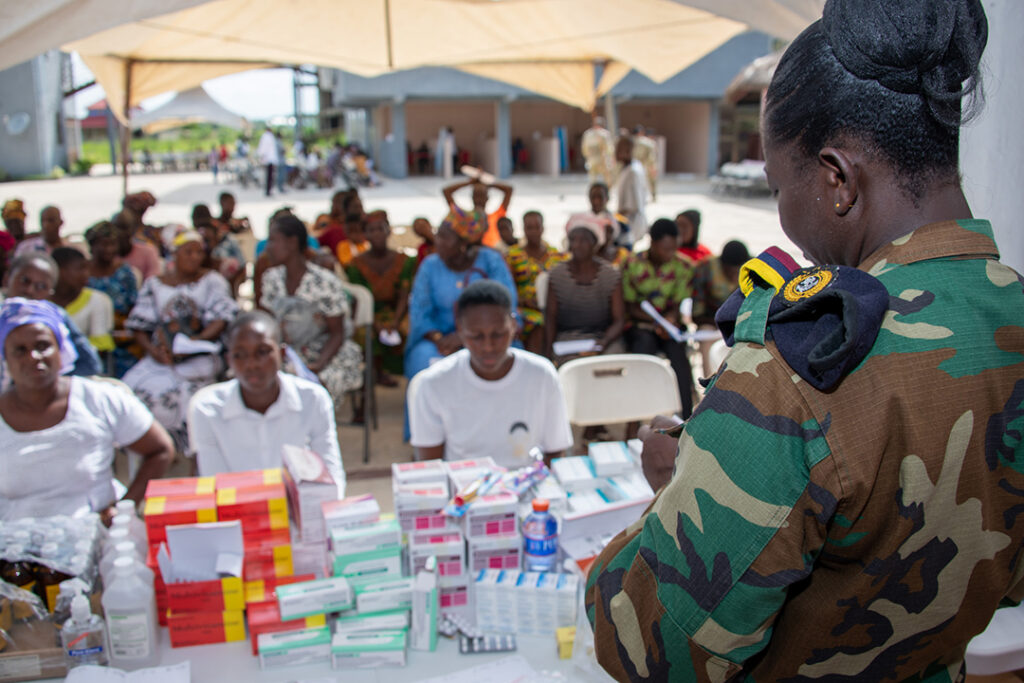ADF STAFF
The Ghana Armed Forces (GAF) hosted a five-day workshop in September with the U.S. Army Southern European Task Force, Africa (SETAF-AF) that focused on enhancing the capacity of civil-military operations (CMO) amid increasing insecurity in northern Ghana.
Military forces use CMO to build trust with civilians and win allies in counterterror efforts.
The workshop supported the GAF’s efforts to create a CMO directive that will institutionalize CMO, enhance CMO training and operations, support civil authorities, and improve security and stability.
“This symposium represents a vital opportunity to share knowledge and strategies that can address the pressing challenges we face together,” Brig. Gen. Kweku Dankwa Hagan, deputy chief of staff in charge of operations and training at Ghana Army Headquarters, said in a news release.
The event also supported SETAF-AF’s efforts to maintain its military readiness and strengthen its partnership with Ghana.
“This was a great event to work on our own skills to plan and execute effective activities with the GAF,” U.S. Army Capt. Kandace Burton, a SETAF-AF Civil Affairs Battalion officer, said in the release. “It allowed us to not only improve our capabilities, but also to work closely with our GAF counterparts to ensure mutual understanding and effectiveness in future engagements.”
The workshop was timely, as it was held days after terrorists killed at least 12 Togolese Soldiers in an attack on a military base 70 kilometers from Ghana, near the Burkina Faso border. Due to this attack and others, security analysts say Ghana must fortify its porous borders and increase its counterterrorism collaboration with neighboring countries.
Analysts also say open communication with locals in border areas is critical to thwarting potential terrorist threats.
“We haven’t really done enough to counter the threats because our approach has been so one-sided, unsustainable and too militarized,” Adib Saani, executive director of Ghana’s Jatikay Centre for Human Security and Peace Building, told The Africa Report. “The communities along the borders must be sensitized so that they assist the military with relevant information to keep the borders safe.”
Days after the Togo attack, Burkina Faso and Ghana resumed joint security patrol operations that were suspended after Burkina Faso left the Economic Community of West African States (ECOWAS). Patrols also have increased along Ghana’s border with Togo.
“The only thing keeping us safe from the terrorists is not their inability to attack but their lack of interest, because Ghana remains a major logistics hub for them,” Saani told The Africa Report.
Ghana’s location offers terrorists an avenue to sell and smuggle goods and livestock and is a safe place to stay and deploy into Burkina Faso to fight, according to Ghanaian journalist Eliasu Tanko, who monitors extremist movement
“Some also have very large families settled in Ghana and so they wouldn’t want to do anything that would bring much attention on them from the security forces here,” Tanko told African Arguments.
Regional counterterrorism efforts are further complicated by the departure of Mali and Niger from ECOWAS. Albert Kan Dapaah, Ghana’s minister for national security, has urged the three Sahelian countries to rejoin the regional bloc for security reasons.
“Let us continue to have the political differences,” Kan Dapaah told Ghana’s Citi News. “Even within the same countries, there are political differences, there will always be political differences. But at all times, let’s make sure that there are no differences when it comes to making sure that our countries are safe, peaceful and secured.”

